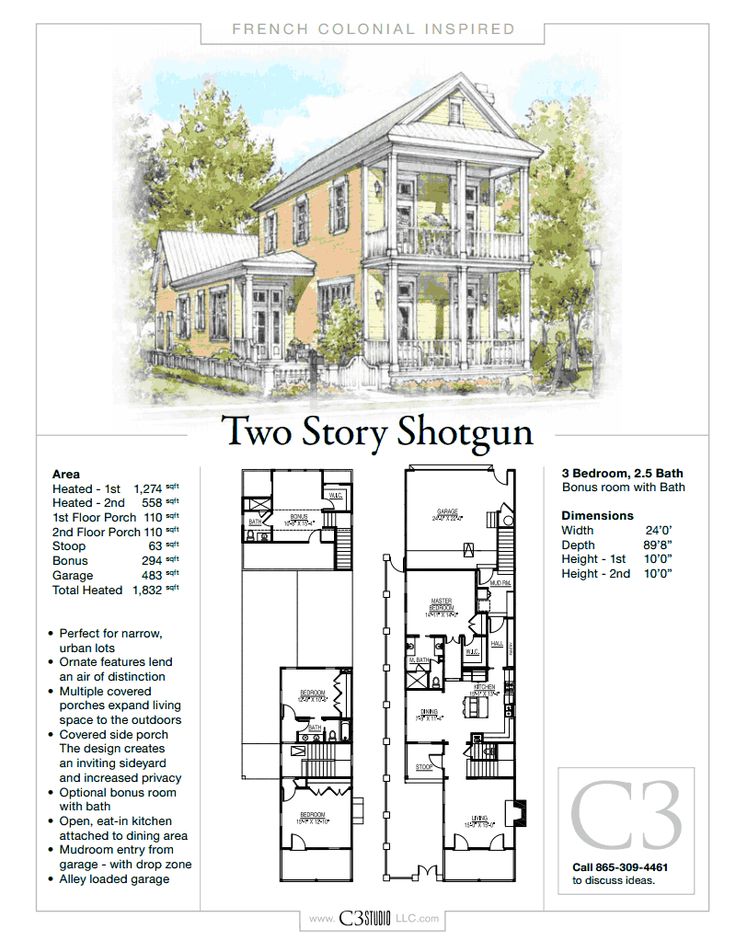Unlocking the Secrets of Shotgun House Plans: History, Design & Modern Living
Have you ever wondered about those long, narrow houses, often seen in historic neighborhoods, with rooms arranged one behind the other? These intriguing dwellings are known as shotgun houses, and their unique design tells a compelling story of cultural adaptation and practical living. This article delves into the captivating history of shotgun house plans, exploring their origins, evolution, and enduring appeal in contemporary architecture.
Shotgun houses, characterized by their linear layout where rooms are arranged in a single file, are a distinct architectural style with roots deep in West African and Caribbean traditions. Their name is thought to originate from the belief that one could fire a shotgun through the front door and the pellets would travel straight through the house and out the back door without hitting anything. These homes emerged as a practical solution for affordable housing, particularly in the southern United States during the late 19th and early 20th centuries. Their simple construction made them quick and inexpensive to build, making them accessible to working-class families and newly freed slaves.
The prevalence of shotgun houses in cities like New Orleans, Mobile, and Key West speaks to their adaptability to warm climates. Their narrow design maximizes cross-ventilation, helping to keep interiors cool during hot summers. The high ceilings further enhance airflow, contributing to a comfortable living environment. Beyond their practicality, shotgun houses also became important symbols of community and cultural identity, particularly within African American communities.
While shotgun house plans offered affordable housing and efficient cooling, they also presented some challenges. Privacy could be an issue, as sound easily travels through the linear layout. The lack of hallways meant that residents had to pass through one room to get to another. Despite these limitations, shotgun homes remain a testament to ingenuity and adaptability in architectural design.
Modern adaptations of shotgun house plans address some of the historical limitations while preserving the unique character of these dwellings. Architects and designers are incorporating open-concept layouts, adding hallways, and reconfiguring room arrangements to create more functional and private spaces. This renewed interest in shotgun-style homes reflects a growing appreciation for their historical significance and their potential for sustainable and affordable housing solutions.
A typical shotgun house is one room wide and two to four rooms deep, with doors at each end of the house. They often feature a front porch or stoop, providing a social space for residents to interact with their neighbors.
Benefits of Shotgun Style House Plans:
1. Affordability: Simple construction and readily available materials make them budget-friendly.
2. Energy Efficiency: The narrow design and high ceilings promote natural ventilation, reducing the need for air conditioning.
3. Community Oriented: The front porches encourage social interaction and foster a sense of community.
Advantages and Disadvantages of Shotgun House Plans
| Advantages | Disadvantages |
|---|---|
| Affordable construction | Limited privacy |
| Energy efficient | Can feel cramped |
| Community-oriented design | Limited storage space |
Best Practices for Implementing Shotgun Style House Plans:
1. Maximize Natural Light: Incorporate large windows and skylights to enhance natural lighting.
2. Optimize Ventilation: Ensure adequate cross-ventilation through strategically placed windows and doors.
3. Create Privacy Zones: Utilize room dividers, curtains, or built-in shelving to create a sense of privacy within the linear layout.
4. Update the Layout: Consider incorporating hallways or open-concept living areas to improve flow and functionality.
5. Embrace the History: Preserve original architectural details where possible, while incorporating modern amenities to create a unique blend of old and new.
Frequently Asked Questions about Shotgun House Plans:
1. What is a shotgun house? (Answered above)
2. Where did shotgun houses originate? (Answered above)
3. Why are they called shotgun houses? (Answered above)
4. Are shotgun houses still being built today? Yes, with modern adaptations.
5. Are shotgun houses energy efficient? Yes, their design promotes natural ventilation.
6. What are the disadvantages of shotgun houses? Primarily privacy and potential cramped feeling.
7. How can I modernize a shotgun house plan? Open concept layouts, added hallways.
8. Where can I find shotgun house plans? Architectural firms specializing in historical renovations.
Tips and Tricks for Shotgun House Plans:
Use light colors to make the space feel larger. Incorporate mirrors to reflect light and create an illusion of depth. Utilize vertical storage solutions to maximize space.
In conclusion, the shotgun house, a seemingly simple structure, holds a rich history and offers a unique approach to residential design. From its humble origins as an affordable housing solution to its modern resurgence as a symbol of cultural heritage and sustainable living, the shotgun house plan continues to capture our imagination. While the traditional layout may present some challenges, contemporary adaptations offer innovative solutions that address these limitations while preserving the distinctive charm of this architectural style. By understanding its history, appreciating its strengths, and embracing its potential, we can unlock the secrets of the shotgun house plan and create truly unique and inspiring living spaces. Whether you're drawn to its historical significance, its sustainable features, or its adaptable design, the shotgun house plan offers a compelling alternative to conventional housing models, reminding us that sometimes the most ingenious solutions are also the simplest. Consider exploring this fascinating architectural style for your next home project – you might be surprised at the possibilities it holds.
Hes squidward youre squidward embracing our inner grump
Sending holiday wishes via email a guide to festive digital greetings
Skip counting multiplication charts printable powerhouse for math mastery















